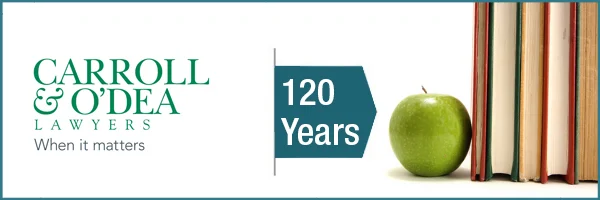
Education Law Notes Term 2, 2020
Published on June 12, 2020 by David Ford
Introduction
U.S. Chief Justice John G. Roberts Jr. delivered an online address at his son’s high school in May 2020, telling those graduating during the coronavirus pandemic that they will be tested by a “precarious” period and that “the pandemic has pierced our illusion of certainty and control.”
Roberts said to the class of 2020, “this graduation season is not what you anticipated. I’m not talking about missed ceremonies or parties. I’m talking about the level of uncertainty you face at this important time of transition. I think the pandemic is the world’s way of saying to mankind, ‘You’re not in charge.'”
That is an important lesson not only for our students but also for school governors, leaders and teachers.
In these Education Law Notes, we deal with a couple of issues where it is easy to feel out of control. First, we provide some tips for dealing with contractual disputes arising from the coronavirus pandemic. Second, we look at a recent UK case which has us wondering whether there is any limit to a school’s liability.
We have also included an update on the National Redress Scheme and a reminder that the time for joining is almost over.
Enjoy the read and the upcoming winter break! For those who have been working so hard in our schools during this incredibly difficult period, you certainly deserve it.
Regards,
Five tips for school leaders dealing with contractual disputes in the COVID-19 era
The outbreak of the 2019 Novel Coronavirus (COVID-19) has led governments around the world to impose strict quarantines to try to contain the spread of the pandemic. The closing of international borders has disrupted supply chains, while a sharp decrease in consumer spending and increase in government restrictions have resulted in almost unprecedented job losses and cash flow issues. These restrictions, while necessary, have dealt a devastating blow to our economy and disrupted business operations in all sectors.
Despite the easing of restrictions, we have been busy answering enquiries from principals and other leaders in the education sector about the impact of COVID-19 on contracts with students, suppliers and employees. While there are no easy answers to the problems we are facing in the COVID-19 era, here are our best tips for navigating contractual disputes in the age of COVID-19.
- Review your Contracts
- Consider other legal alternatives
- Negotiate with stakeholders
- Stay abreast of government restrictions and regulations
- Seek assistance and consult available resources
Is a school liable for the criminal behaviour of its teachers towards students who have left the school?
A very recent English case raises the interesting issue of whether a school can be vicariously liable for the sexual abuse of a student by one of its teachers where the abuse began while the student was at school and continued for some years after that.
A man claimed damages for personal injury, loss and damage as a result of sexual abuse and assaults committed upon him by a physical education teacher at a London school, where he was a student from 1980 until 1982 (when he left briefly to attend another school before returning) and then again for a short time in 1983/4. The man alleged that these assaults continued after he left the school up until and including 1988. He sued the London Borough of Haringey which operated the school on the basis that it was vicariously liable for the teacher’s actions.
Royal Commission Update
Ensuring maximum participation in the Scheme
Under new arrangements agreed by the Australian Government and all state and territory governments, institutions named in the Royal Commission into Institutional Responses to Child Sexual Abuse or in an application received by the Scheme must provide a clear written statement setting out their intention to join the Scheme by no later than 30 June 2020. These institutions will be expected to join as soon as possible, but no later than 31 December 2020. This additional time reflects the maximum time needed to complete the on-boarding process and recognises the changed capacity of many institutions due to COVID-19.
If by 30 June 2020 an institution has failed to signify its intention to join the Scheme, it will immediately be publicly identified and jurisdictions will consider appropriate action. This may include financial sanctions applied by state, territory or Commonwealth governments, and changes to an organisation’s charitable status. Naming institutions is considered necessary to ensure that people wanting to access the Scheme know the status of relevant institutions.
Where the Scheme receives an application naming a non-participating institution after the 30 June 2020 deadline, the Scheme will contact the institution and the institution will be given six months to join. Should that institution fail to join the Scheme within the six months, the institution will be publicly identified by the Scheme in accordance with Scheme legislation, and jurisdictions may apply other appropriate sanctions. This provides certainty for survivors who were victims of abuse in an institution that has not yet been named, that they can lodge their application at a later date, whilst ensuring that organisations cannot drag out the process of joining, which causes yet more harm to survivors.
In addition, institutions that are already participating in the Scheme will be allowed to add additional institutions to their participating groups after the 30 June 2020 deadline.
These measures are designed to ensure that as many survivors of institutional child sexual abuse as possible will have access to redress beyond 30 June 2020, whilst ensuring that those institutions that have failed in their duty to survivors by avoiding joining the Scheme are held to account.
The First Interim Report of the Joint Select Committee on Implementation of the National Redress Scheme April 2020 recommended these measures. Its full report can be found here.
If you need help in weighing up the pros and cons of joining the Scheme, please contact David Ford.
